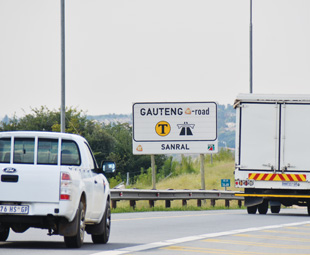Worth the paper it’s printed on?

What may come of the e-toll report?
Most comments surrounding the e-toll report have, unsurprisingly, been negative. One newspaper summed it up quite neatly: “the can has just been kicked down the road once more”. True, but let’s cut the panel some slack. Given the messy run-up to the crisis now facing the South African National Roads Agency (Sanral), did we expect anything more than a patchwork of suggestions that satisfy no one?
Considering the short timeframe allowed, this report is a huge improvement on the mechanistic, formula-based transport “studies” that have accompanied projects like the Gauteng Freeway Improvement Project (GFIP), Gautrain and bus rapid transit (BRT).
The e-panellists have at least emphasised the human impact of transport schemes – a refreshing departure from the engineering-based approach. Who would have expected a quote from the Moral Regeneration Movement as early as page three?
One of the main themes of the report is the lack of alternatives to e-tolls. The biggest problem, by far, is the pathetic state of public transport throughout South Africa – the panel was clearly stung by the condemnation of inadequate public transport by different groups representing civil society.
This column has repeatedly stated that better public transport would reduce the need for additional road space. We have been fed the nonsense that, because traffic is growing at seven percent a year, we need high-speed railway lines and additional lanes on the freeway.
We have never bothered to challenge this myth, resulting in the crisis we now face. Why is traffic growing at seven percent a year? Well, as soon as people earn R6 000 a month, they start using cars. Why? To escape our appalling public transport. By the time people earn
R20 000 a month, almost all of them go to work by car. That is our problem, but the report fails to make the point …
Sadly, it shoots itself in the foot as early as page seven when it proposes: “Complete exemption for low-income vehicle owners … this would cater for students at tertiary institutions who do not have access to public transport.”
The last thing we should do is encourage low-income people to use cars! We should be doing everything to encourage all people, not only those with low incomes, to use public transport!
The reference to students is also baffling. I’ve previously suggested that this group should be given a discounted bus/train pass for travel throughout the province. We can’t do that, however, as there is no provincial network of formal public transport in Gauteng, nor anywhere else in South Africa.
Although it says all the right things about the need to coordinate public transport, a traffic authority, through ticketing, and so on, the report is still too polite. Presumably with an eye on its sponsor, it tells us that “the Gauteng Provincial Government (GPG) has begun to make progress in the long battle against transport inefficiencies and inequalities.”
Nonsense! Let’s highlight the appalling record of the GPG in public transport …
In 2001, a Council for Scientific and Industrial Research (CSIR) report was sent to the GPG recommending a new bus route pattern for Soweto and surrounding areas. Nothing came of the report. It needs to be revived.
In late 2007, the GPG created a body called the Gauteng Transport Management Authority (of which I was a member). It was disbanded in 2008. The GTMA again submitted the Soweto report, which was again ignored.
In 2013, the GPG produced a 25-year transport plan. The public transport component of the plan refers to 164 bus routes that need to be introduced. These 164 routes require
8 000 new buses costing R24 billion, plus at least another R14 billion for bus stations on 740 km of proposed busways.
I suggest that this scheme is as bogus as e-tolling, Gautrain, and the different BRT schemes. We can start to achieve the same results at far lower cost by reorganising the 2 500-odd buses that fall under the GPG’s control.
While neglecting the basics, the GPG has nevertheless managed to expend huge effort and resources on giving us Gautrain, which costs the taxpayer R77 for each passenger trip!
Finally, we return to the dismal role of the academic world in the area of public transport education, which the e-toll report delicately refers to as an “emerging field” (page 179). That’s a nice academic way of saying that we are clueless. Are we doing anything about it?
Let’s scrap e-tolls, but leave the gantries as a monument to incompetence, mismanagement and neglect. Pay off the creditors, raise the fuel levy, “sort out public transport” (page 182) and then see what happens. We might be pleasantly surprised.
Vaughan Mostert developed a love for public transport early in life, which led to a lifelong academic interest in the subject. He recently retired as a senior lecturer from the Department of Transport and Supply Chain Management at the University of Johannesburg. Through Hopping Off, Mostert leaves readers with some parting food for thought as he continues his push for change in the local public transport industry.
Published by
Focus on Transport
focusmagsa




